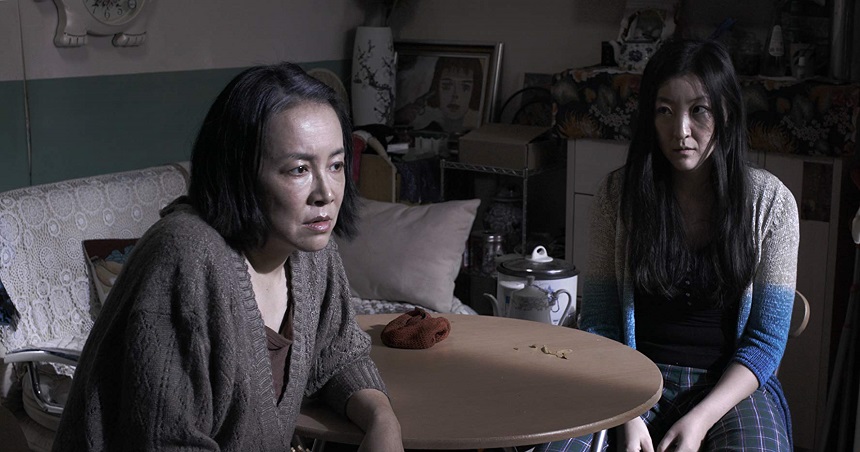Melbourne 2018 Review: GIRLS ALWAYS HAPPY, Yang Mingming's Biting Dysfunctional Family Film Debut
Yang Mingming's conversational-clash indie drama pits mother against daughter.

Girls Always Happy proves anything but in Yang Mingming’s feature film debut. She both directs and stars as Wu, the troubled daughter and one-half of the powerfully dysfunctional family dynamic that anchors the film. The other half is her mother (Nai An), a depressed and repressed woman, single and living under the thumb of her father (Huang Wei). She stays with Wu in the Hutongs, an old Beijing district with winding alleys and cobbled streets.
This slightly bigger residence can barely accommodate the big personalities of them both, and so they take turns appeasing the doting grandfather who lives alone. This is in the desperate and petty hope that he left them a residence in his will, so they can turn a profit from it. This situation makes them feel trapped, and they lash out at each other with sudden resentment and cynicism to spare thanks to the intelligently witty and scathing screenplay.
The naturalistic screenplay of Girls Always Happy is layered with a complex understanding of its central characters and their economic position. The flaws and complete histories of the mother and daughter can be felt through their stinging vocal exchanges and severe stares. They are also both writers so there is a sense of artistic temperament on top of the matriarchal malaise. Yang Mingming who plays Wu also lived with her real mother in the Hutongs, and this definitely adds an observable personal connection.
Girls Always Happy utilises its best dialogue over food. This is a fantastic metaphor used throughout to highlight the tone of each conversation. From the mother sadly sucking down on packeted milk drinks, to the pair munching on lamb chops and spitting the leftovers into a bowl as they exchange passive-aggressive quips.
Food is a cohesive part of their relationship, and is reused to great effect, particularly how it conveys their values and attitudes. When Wu eats leftovers with a chatty ex-classmate who drops by, the mother opens the fridge later only to discover to her despair what she had been looking forward to all day has been selfishly devoured by her offspring. In less common happier times, Wu is seen picking out a melon, and later shares it with her mother. These small moments sound uninteresting but the context of the situation is enhanced by the way they, and others in their life, communicate over food.
The focus on the little details is what makes Girls Always Happy so compelling. Outside the smartly constructed dialogue is the body language, mannerisms and personality traits of both Wu and mother that conveys much about them. This is very strong character work of two very petty and petulant people. Their passive-aggressiveness and critical snipes progress to full-on personal attacks and Yang Mingming brilliantly builds momentum of the conversation until it boils over and the mother retreats, often wailing melodramatically.
This is often shockingly funny, and perhaps a family trait as the needy grandfather also shares this immaturity, acting up his hearing condition and constantly calls on either of them to perform pointless tasks, with not a hint of gratitude.
Outside the central conflict of mother versus daughter, the supporting cast seem equally as absorbed in their own lives, drifting through the seemingly pointless day to day. Wu’s mother is surrounded by fickle friends peddling magnet-activated trinkets as a solution to her problems. Wu’s on-again off-again boyfriend Zhang (Zhang Xianmin) and the mother’s divorced friend Baogang (Li Wenbo) simply end up offering an escape from the confines of each other. It is ironic then that mother and daughter bond when dissing the men in their lives, despite the benefits Zhang offers Wu.
Men, and the ruling society they represent are criticized in Girls Always Happy. The patriarchy is felt through the grandfather’s overbearing presence, but also the overruling oppression of the old guard, such as the lazy elderly men that take turns observing the Hutong streets, or the bitter security guard Wu later contends with. The old generation are unable to understand or assist anyone else, and the younger generation are conflicting with them more than ever.
The economic situation in Beijing is also highlighted in Girls Always Happy. The residences in the Hutongs is is a specific Beijinger subculture that is brought to life by cinematographer Shan Xiaomin’s digital lens. The twisted maze-like paths are filled with vibrant life as the camera playfully follows Wu out to the urban sprawl that will eventually consume this storied section of the city. Additionally the interior design of their home feels authentic and lived-in, with little details everywhere the eye wanders on screen.
Girls Always Happy is an artfully constructed indie drama. The confident direction, focus on detail and convincing chemistry of the mother and daughter paradigm makes for an impressive, darkly funny and personally charged debut.
Girls Always Happy
Director(s)
- Yang Mingming
Cast
- Nai An
- Yang Mingming
- Xianmin Zhang
- Qinqin Li







